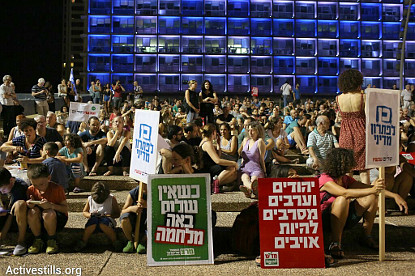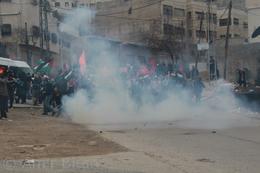MK Nitzan Horowitz is very proud of his friendship with the Kibbutz movement. In a very emotional post published in the latter phases of the latest round of bloodshed in Gaza, MK Horowitz expressed his love for the Kibbutzim and praised their display of the principle of ‘mutual assistance’ during the war, when Kibbutzim throughout the country took in and hosted members of Kibbutzim near the Gaza Strip who were under bombardment. He sees in the kibbutz movement an expression of loftier values: “Even in the most privatized, most ‘modernizing’ kibbutz, there is a security network and mutual responsibility and social justice more than in any other form of settlement.” He concludes with a political statement with clear and direct economic implications:
"That’s why next time you talk about land and funding arrangements that strangle the Kibbutzim, preventing them from thriving and developing – think about that
too, about how we’d hate to see Israel without Kibbutzim and how much we’re
proud of our Kibbutzim."
Full Facebook post by Nitzan Horowitz, August 25 2014:
"I love a kibbutz. I always have. Even when it was popular to deride and mock them. Now everyone sees the beauty and vitality and qualities of the kibbutz movement. It’s just a pity this is all being rediscovered because of the blood and fire in the ‘mortar fire Kibbutzim’ – Nachal Oz, Nir Oz, Nir Yitzhak, Magen…
I’m a city guy: Tel Avivian, originally from Rishon Le-Tzion, and I’m a devotee of the city, both personally and as a vital social landscape. And as an urban person with every fiber of my being, I am an avid admirer of the rural settlement and the kibbutz movement. Because beyond the beauty, there is character: Even in the most privatized, most ‘modernizing’ kibbutz, there is a safety network and mutual liability and social justice more than in any other form of settlement. And that’s true in the framework of an entire movement. When kibbutz children are evacuated because of deadly fire and are taken in by another kibbutz, where is the state?! It doesn’t even give one shekel, as though it doesn’t exist. Let the families manage by themselves. But friends help. Because there are friends. There is a kibbutz and a kibbutz movement.
The kibbutz idea is alive and kicking. People are seeking community; they want that ‘togetherness’, to be part of some form or ‘we’, not to be alone. And you better believe that even those in the Gaza Envelope kibbutzim that have been the worst hit for years now have waiting lists of people wanting to join.
True, the kibbutz isn’t perfect and there are lots of problems in the kibbutzim. But where aren’t there? And if there are problems, we should help and they should be solved. And that’s why next time you talk about land and funding arrangements that strangle the kibbutzim, preventing them from thriving and developing – think about that too, about how we’d hate to see Israel without kibbutzim and how much we’re proud of our kibbutzim."
It seems that there is no such thing as free love. MK Horowitz is seeking to take advantage of the public’s esteem for the kibbutzim adjacent to Gaza following their suffering during a war, on the very same very days in which a small boy and two adults were killed in kibbutzim. The declaration was meant to advance the kibbutzim’s campaign for real estate, for a land settlement that would secure their hold over valuable landed property all over Israel, and for construction rights that would permit them to turn this land into source of profits and keep the kibbutzim as prosperous sector that enjoys massive privileges (even the Labor Party chairman joined that campaign).
Any rookie political observer could understand what MK Horowitz might stand to gain. In his party, Meretz, kibbutz members form a massive power block, and as a politician who reached his political standing outside party circles and relies on a different support base, Horowitz seeks to win some support among kibbutz members in his party.
But his post is not just another self-serving outpour. It contains something else, something much more authentic than mere political and economic manipulation of the crisis of the hour. This is a text that also expresses a deeply held perception, linking political and social ideas among the so called ‘Zionist peace camp’.
This is a political camp that seeks peace and fights for a peace agreement, and we must assume that it does so in earnest. For instance, its members caught a fair bit of flak for supporting peace talks and establishing a Palestinian state in the Occupied Territories. Therefore I wish to formulate my critique of this camp by taking seriously its aspirations for peace and ideas about social justice, shared by Meretz and others, of both kibbutz and city.
Even if the main political forces involved in the recent round of warfare (the rightist Israeli government and Hamas Islamic movement) don’t realize it, the latest round of war brought the Palestinian refugee issue back to public awareness, and from there it might make it to the negotiation table too. You can’t just bomb, shell and destroy tens of thousands of homes of refugees and children of refugees and expect there to be no discussion of their status and rights as refugees, as displaced people, no discussion of a solution to their plight or of ways to honor their rights within a negotiated agreement. Each time Israel bombs the house of a Palestinian refugee—whether in Lebanon or in Gaza—it necessarily enforces the demand for return.
As Israel’s Chief of General Staff during the first Lebanon War, Raphael Etan, said: “The war in Lebanon is for the land of Israel.” He was right. But he was also right in another sense, one that he wouldn’t be so fond of: every generation of Palestinian refugees suffering bombardments, shelling and Israeli occupation, renews its claim and demands to return to the land from which their families were uprooted. In that sense, it doesn’t matter at all that Hamas hasn’t put the refugee issue of the right of return at the forefront; it doesn’t matter that the Palestinian Authority led by Abbas places the refugee issue low on its agenda; Israeli indifference doesn’t matter either: The refugees are there and they know their rights, they’ve not given up on it and they aspire to fulfill it. It doesn’t matter how remote realizing the right of return might seem. Realizing other rights of refugees wherever they are is remote anyway. Their life at present, under siege or occupation, or as second or third class citizens, gives them no reason to give up on the right of return. Only they can decide whether to give up or to fulfill their right.

"Peace camp" platform.
What’s all this got to do with MK Horowitz, the kibbutzim and the Zionist peace camp? Well, the kibbutzim are one of the main sectors benefiting from the lands of Palestinian refugees. They aren’t the only ones. Many sectors of Israeli society benefit from refugee lands and property. But the kibbutz movement was and remains one of the main benefactors, and was historically a highly active perpetrator of different rounds of theft of Palestinian land—both from refugees and even from uprooted and displaced Palestinians who remained inside Israel, whose land was taken in several rounds of confiscations over the 1950s, 60s and 70s.
It is no coincidence that the peace agenda of the ‘Zionist peace camp’ fails to include the right of return and it is no coincidence that its social justice values do not include redistribution of land, planning and building rights, or even minor corrections to the municipal borders that disadvantage the so called “development-towns” of poor Jews (mainly of Mizrahi origins) and Arab towns and villages in favor of regional councils (dominated by kibbutz and moshav settlements).
The more accurate definition for the ‘Zionist peace camp’ would be the conservative peace camp. This is a political and social sector for which peace means forcing others to accept its dominant status and privileges. Peace, for this camp, means Palestinians accepting their displacement and dispossession. For them, peace and social justice mean that Mizrahi Jews, along with all the other poor Jewish and Arab township dwellers, accept being deprived of privileges enjoyed by the kibbutzim on their lands. They would certainly accept an independent Palestinian state in Gaza and the West Bank, even a prosperous one—but the refugees and their offspring shouldn’t dare to demand to return to any of the lands and property taken away from them.
It’s not just the kibbutzim. The entire Jewish Ashkenazi peace camp and its educated middle class members are interested in a welfare state in order to minimize social struggle inside Israel. They are indeed interested in this, on one condition: that social justice arrangements doesn’t diminish their privileges, their accumulated assets, their supremacy in terms of higher education and subsidized culture. This camp will surely never imagine undermining the supremacy of Western culture, which they see as a universal yardstick for assessing any culture and as the source of their symbolic power, the basis of their claim for social and moral superiority.

Peace camp demonstration, August 2014.
It is no wonder that the Zionist peace camp’s calls for peace find little support among other sectors in Israeli society. It is hard to get support for such a transparent project for reproducing supremacy. No wonder that Palestinians do not really believe the sincerity of Zionist calls for peace. Certainly not after the disappointments of Oslo, when the settlers of 1948 refused to truly confront the settlers of 1967 for the sake of ‘a political compromise.’ For this Israeli evasion, the Palestinians in the Occupied Territories paid high price during the Oslo years, with a massive wave of settlement expansion and the suffocation of Palestinian society in the occupied territories.
The historical compromise between Israel and the Palestinians, the one discussed in the 1990s, required political courage and determination and a willingness to pay the price. But then the Zionist peace camp discovered that it wasn’t actually ready to negotiate a compromise with other sectors of Israeli society on reshaping power relations, essential for reaching an historical compromise with the Palestinians. The Zionist peace camp was not prepared to reach the necessary compromises with Shas (religious Mizrahi party) over resources, over the orientation of Israeli culture and society. They weren’t ready to bring about significant social change that would positively link efforts for peace with the advancement of discriminated and excluded social strata. On the contrary: they tied themselves and their peace project with neo-liberal reforms, which only widened internal socio-economic gaps.
So, can we expect anything from the Israeli peace camp? No. There’s nothing to expect from the Israeli-Zionist peace camp. The peace it seeks is mainly about getting others to accept the supremacy and status of the social groups it represents. An acceptance of one party’s superiority is not peace and reconciliation between peoples. A “peace camp” that is not prepared to question the colonial origins of the distribution of wealth and control is actually about perpetuating superiority. Peace without de-colonization will not be true peace. At best it can be a political settlement that would enable civic struggles for de-colonization, for the return of refugees, for the redistribution of land and property, for a change in cultural and social hegemony, to be conducted democratically and non-violently. I hope that this will happen.
But for there to really be peace, for Israelis and Palestinians to reconcile, there must be a deep social change, a process of de-colonization, a reversal of the process of colonial dispossession, both material and cultural. That is why we are trying to build a liberation movement before we can possibly talk about a peace movement.
Translated by Keren Rubinstein
Photo: Oren Ziv, Activestills.


